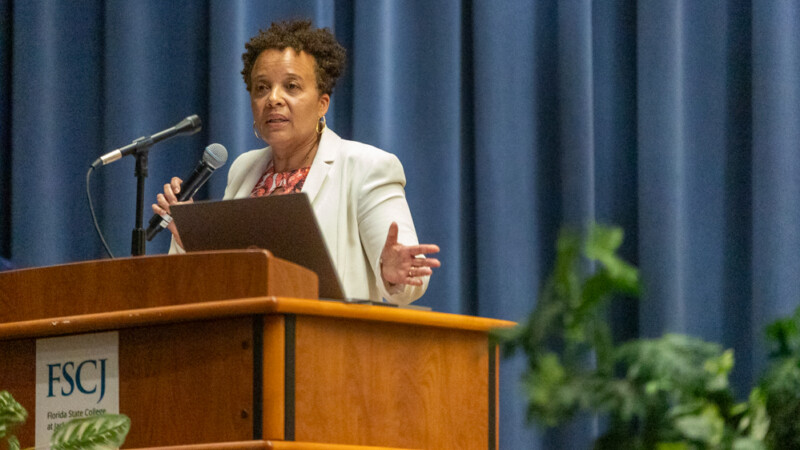Northeast Florida lawmakers have filed more than 100 bills before the 2025 legislative session officially gavels in at 9:30 a.m. Tuesday.
The legislation by the Jacksonville area representatives addresses a broad swath of issues, including single-family home zoning; the restriction and promotion of diversity, equity and inclusion programs at the local level; the property insurance crisis; pedestrian safety in school zones; historic preservation; and localizing pieces of President Donald Trump’s policy positions.
Republicans enter the 2025 session again holding supermajorities in the House and Senate, control of the governorship and all statewide elected offices. In the House, the GOP holds 86 of the chamber’s 120 seats. In the Senate, Republicans outnumber Democrats 28-11 members.
WFSU Public Media Assistant News Director Regan McCarthy has covered the Florida Legislature in Tallahassee for more than a decade. She says the GOP supermajorities will ensure Republicans control the agenda and will leave narrow avenues for Democrats wanting to secure a legislative achievement.
“Republicans are really the people who are going to control what we see coming out of this session this year,” McCarthy says. “My eye is on the things that I think are most likely to pass [and] are most likely to become laws that are going to impact our audience. And those generally are going to be things that are put forward by Republican lawmakers.”
Florida Legislature-Trump alignment
According to McCarthy, the legislative package on illegal immigration enforcement, approved during a special session in January and February, could foreshadow a theme for Florida’s GOP lawmakers over the next two months: crossover with President Donald Trump’s policies.
Senate Bill 608, introduced by Sen. Nick DiCeglie, R-St. Petersburg, would change references of the “Gulf of Mexico” to the “Gulf of America” across state statutes.
Rep. Dean Black and Sen. Clay Yarborough, both Jacksonville Republicans, have filed identical bills, HB 1571 and SB 420, which would prohibit county and city-level governments from creating or adopting DEI-related resolutions, ordinances, regulations or programs at risk of penalties.
“This special session really taught us that lawmakers, legislative leaders, Republican leaders, are really working to show their willingness and maybe even an excitement to align with the Trump administration,” McCarthy said.
Proposals like the Yarborough-Black bill on DEI programs is one example of a trend by the Florida Legislature in recent years to preempt local control of county and municipal governments in Florida.
“I think that preemptions is something that we’ve seen come up again and again throughout the years that I’ve been covering the Legislature. I think we’ll continue to see preemption now,” McCarthy says. “One thing that’s interesting is that we often talk about the government closest to the people is the government most likely to have the greatest impact on your day-to-day lives. And I think that’s true, but … as these preemption bills move forward, then the impact that the state government, rather than our local government, is actually increasing.”
From Jacksonville to Tallahassee:
Here is a sampling of bills that Jacksonville-area lawmakers are sponsoring this session:
- Rep. Sam Greco, R-St. Augustine, and Sen. Tom Leek, R-Ormond Beach, filed twin bills HB 717 and SB 582 to deter property owners from demolishing historic structures. The legislation would allow code enforcement boards or special magistrates to impose a fine up to 20% of a property’s fair or just market value for razing a structure that’s listed on the National Register for Historic Places or considered a “contributing resource” to a National Register district if the demolition was not permitted or the result of a natural disaster.
- Rep. Dean Black, R-Jacksonville, has filed HB 1217 that tightens the requirements for state and local government public employee unions and collective bargaining units to obtain certification and recertification by requiring a majority vote of all the workers in the bargaining unit. Current state law only requires the union to get a majority of the workers who vote in the certification or recertification elections. There is a carve out for police, fire, emergency medical and public safety unions. Sen. Randy Fine, R-Brevard County, has filed a similar bill in the Senate, SB 1328.
- Black is also co-sponsoring HB 401 with Rep. Berny Jacques, R-Seminole, that would allow counties and cities to zone and designate parcels specifically for single-family, owner-occupied homes and for multifamily hybrid housing. The bill states that its intention is to promote and bolster homeownership in Florida.
- Sen. Jennifer Bradley, R-Fleming Island, has filed two bills to protect property owners navigating Florida’s struggling property insurance market. SB 790 would prohibit insurers from canceling policy coverage for properties damaged by hurricanes until repairs are made. The second, SB 792, would require the Office of Insurance Regulation to prepare annual reports for the Legislature and governor that would rate property insurers’ strength against delinquency and other factors.
- Rep. Angie Nixon and Sen. Tracie Davis, both Jacksonville Democrats, want to give homeowners access to direct financial assistance to help ease property insurance costs. HB 959 and SB 1044 would use $500 million in state reserves or unallocated funds to create an Emergency Residential Property Insurance Assistance Fund for homeowners who can demonstrate a financial need and have a household income of $250,000 or less.
Room for bipartisanship
It’s a difficult political climate for the Democrats, but McCarthy says lawmakers in the House and Senate minorities will be looking for areas of bipartisanship and compromise.
For one: Bradley, Davis and Yarbrough have co-sponsored legislation this session that would reverse a 2023 law requiring middle- and high-schools to start school days later.
McCarthy also expects to see the Legislature address Florida’s maternal care deserts and maternal mortality rate and outcomes by increasing access to doula services and increasing training requirements for people entering that field.
DeSantis’s changing influence
Recent legislative sessions revealed fissures in Gov. Ron DeSantis’s sway over state GOP lawmakers when they overrode a budget veto by the governor from 2024 and opened their own special session to address proposed illegal immigration legislation.
Although Republican House and Senate leaders and the governor reached an agreement on immigration, McCarthy says it remains to be seen the extent to which the term-limited DeSantis, who will leave office in January 2027, retains influence to drive debate in the statehouse.
“I think that it was very fascinating to see what happened during the special session when lawmakers definitely let us know that they weren’t willing to go along as they might have done in the past,” McCarthy said.
Vestiges of that debate are still showing, she said. House Speaker Danny Perez, R-Miami, has formed working groups that are looking into some of the governor’s budget vetoes.
“And I think that that’s just a continued signal that, while they did come to an agreement on their immigration crackdown legislation, I think that they are still saying, ‘Hey, we’re not pushovers here in the House and Senate, and we’re not necessarily willing to just say, ‘OK, you’re the governor. We’ll do what you say.’”







